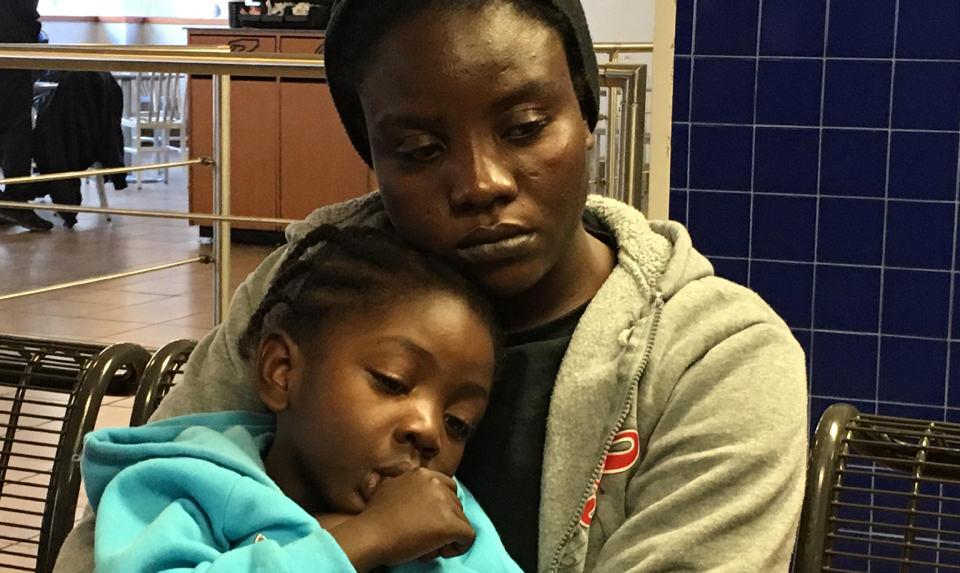
DILLEY, Texas, March 12 — “Baby jails!” That’s what Felipe Vargas calls the massive new family detention centers at this remote outpost 70 miles southwest of San Antonio. Vargas, 40, is an educator and community organizer.
Contrary to popular perception, as asylum seekers, the women and babies held here have legal status in the U.S. This country’s laws and international treaty obligations guarantee protection of “asylum seekers,” says Manoj Govindaiah, managing attorney at the advocacy group RAICES (Refugee and Immigrant Center for Education and Legal Services) in San Antonio.
However, there’s money to be made by keeping them locked up. It didn’t start with Trump, but his administration is continuing and beefing up the practice, says Vargas.
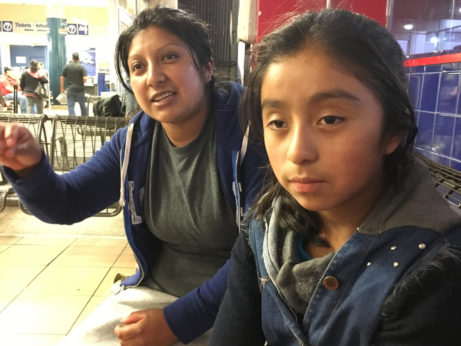
Credible fear
Yeni, 26, and her children Francesca and Pedro are gaunt and stunned-looking as they sit quietly on a wooden bench in a corner of the Greyhound station in San Antonio. [All last names of refugees have been omitted to protect the families’ safety.] After nearly two weeks of detention, an ICE van dropped them off here March 12, along with other “family units,” each little group making its way to waiting relatives across the U.S. ICE makes its unceremonious drop off every day at noon. Vargas comes here whenever he can, to offer assistance to the refugees.
None of the babies cry; none of the toddlers fuss. Q’ueqche’, a Mayan language, is the family’s first language; they are members of that indigenous group in their native Guatemala. Yeni and each of the kids were issued photo ID cards this morning as they were released from detention. The cards attest to their legal status. They have been judged to have “credible fear” of persecution. It is this positive “credible fear” interview threshold that an asylum seeker needs to be allowed to stay in the U.S. while her claim for asylum is being processed.
Fear is written all over the young mother and her children. After a three-week journey from their home in rural Guatemala they crossed the Rio Grande. Yeni looks to be about five feet tall; the water in the river came up almost to here – she points to her ear – says Yeni, so she hoisted Pedro, 6, on her shoulder. The little girl, 10, swam. The border agents were waiting on the U.S. side; the shivering children ran into their arms.
Yeni and her family fled domestic violence in her home. Her husband beat her – she shows a reporter her shattered front teeth, wired together – and then abandoned her to live with his resentful parents. Their food came from working in the milpa – fields of corn, beans and squash – for neighbors. “They didn’t pay us but they gave us to eat,” she explains in Spanish. Francesca, 10, is also experienced at carrying agua y leña – water and firewood – from the forest on her tiny shoulders and balanced on her head.
Yeni’s in-laws continued the abuse, and began targeting Francesca – who has a different father. “They liked the boy but not the girl,” Yeni explained. She knew her life and that of her daughter were in danger when her mother-in-law came at them with a machete. The little family took off, riding flatbed cars of trains across Central America and then following a paid “guide” three days through hills and mountains in Mexico with no food. “The children cried every night,” Yeni said. “We were scared of the animals,” Francesca tried to explain, “especially when we saw a snake.” Pedro discounted the snake: “It was asleep,” he said; the little boy’s fears focus on men with tattoos, who remind him of the gangs that tormented them throughout their journey.
Asylum seekers haven’t broken the law
Attorney Govindaiah explains that under U.S. law, refugees must make their way to the U.S. border in order to apply for asylum. “When these families tell a Border Patrol officer ‘I’m afraid for my life – I can’t go home,’ they are complying with the law,” he explains.
As victims of domestic violence, with no recourse for protection from their own government, the little family fit the requirements for asylum. Federal courts have ordered the Department of Homeland Security to conduct an immediate assessment if the child asylum seekers and their mothers meet the “credible fear” of persecution threshold. But it took 12 days for Yeni to get a 10-minute interview over a phone line with an asylum officer.
Why are they locked up?
If the hundreds of refugee mothers, children and babes in arms here have not broken the law, why are they held incommunicado, surrounded with coils of razor wire, isolated from social services and legal assistance in circumstances documented to damage children? Why wasn’t the family placed in a community–based family shelter?
Such a shelter exists 1,000 miles to the northeast, in Chicago. With a budget of less than $100 a day, the Chicago Abused Women Coalition cares for victims of domestic violence and their children at their Greenhouse Shelter, according to that organization’s tax filings.
But family detention in a private prison facility costs, on average, $1,029 per day for a family of three, according to a 2015 report by Human Rights First. A luxury river view suite at San Antonio’s Hyatt Regency, blocks from the Greyhound station where the ICE van dropped the families off this morning, costs only a third of that.
Cashing in on human suffering
Yeni had no idea the extent to which her jailers had cashed in on her family. There were other corporate beneficiaries too. The vans and buses that transferred them from the detention center to their drop off at Greyhound were all contracted from a subsidiary of GEO. ICE did not respond to inquiries as to the costs of those financial arrangements. At the Detention Center, Pedro and Francesca attended 10 days of classes from an ICE-contracted San Antonio-based charter school that caters exclusively to incarcerated children.
Before she was discharged to await her asylum hearing, Yeni was outfitted with what ICE calls an “ankle bracelet.” It’s not a piece of jewelry. The women call it a grillete – Spanish for shackle. BI Monitoring, a wholly owned subsidiary of GEO Group, charges $1,600/year for each refugee it keeps under electronic surveillance, costing the government $4.41 per immigrant per day, according to a 2015 report by the Department of Homeland Security’s Office of Inspector General. ICE forked over about $50 million in taxpayer dollars on the program last year for all the immigrants it monitors.
Yeni was not bitter about the time in the detention center. After her harrowing journey, she said the agents gave them apples and crackers and she was glad the kids went to class. But she was anxious to end her journey; a half-sister in San Francisco had offered to take her in and little Pedro was terrified of some of the tattooed detention agents.
An asylum seeker is defined as a person outside her own country who has a “well-founded fear” of being persecuted and who cannot rely on her own government for protection from that persecution. In the Central American countries of Guatemala, El Salvador and Honduras, criminal gangs have in some places effectively replaced civil government. Victims of domestic violence, extortion, and persecution of indigenous peoples cannot turn to government for protection, explains Vargas.
According to the ACLU, most of the Central American families detained by Department of Homeland Security have come to the U.S. seeking refugee protection, having fled one of the most dangerous regions in the world, where women and children are abused and killed with impunity. Eighty-eight percent of detained families have demonstrated to a DHS asylum officer that they have a credible fear of persecution if returned to their country of origin.
The shameful history of family internment
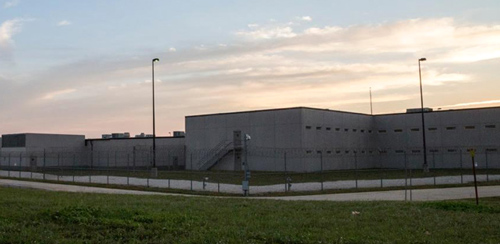
The commissioning of two giant private prison camps, exclusively for women and children, is this country’s largest family internment project since the infamous imprisonment of 120,000 Japanese-Americans during World War II. The existence of these camps can only be accounted for by the billions of dollars their incarceration generates for the world’s largest for-profit prison operators, Vargas concludes.
CoreCivic and GEO Group run the 2,400-bed-and-crib detention center in Dilley and the 830-bed-and-crib center in nearby Karnes, respectively. CoreCivic rebranded itself from Corrections Corporation of America (CCA) last October; GEO is the former Wackenhut. Through a recently negotiated no-bid contract, the Department of Homeland Security guarantees CoreCivic payments of a billion dollars over four years, the Washington Post reported. Vargas says he can think of a lot better uses for those billions of dollars – sending tens of thousands of kids to college, for one.
Yeni’s family ran to the authorities, not from them. Her presence is legal. Why, asks Vargas, the humiliating requirement to wear an uncomfortable electronic ankle shackle, except to move taxpayer money from the Treasury into the bank account of yet another private contractor?
Fleeing extortion
Yahira, 24, fled for her life from her native Honduras. She’s sitting across from Yeni and her family on a wooden bench at the Greyhound station too. She is a member of the Garifuna community, descendants of Carib natives and enslaved Africans and is fluent in both Spanish and Garifuna. Yahira was making a modest living for herself and Ciana, 16 months, by setting up a food stand in front of her home, selling the tacos she made herself. She was earning 2-300 lempiras a day ($8-12) until a gang started to extort her, she explained in Spanish.
One day last July, “three men came to my house, and said I had to give them money or they would kill me. One came to the door. I could see the other two standing back and watching from the distance.” She turned over half the day’s proceeds. The men started coming almost every day, demanding more and more money and threatening her and the baby, she said. There wasn’t enough money left to buy the ingredients for the tacos, so in November, “I had to shut my business down.”
In December she left her home, her baby on her hip and a small bag of clothes in her hand. “It took one month on the train,” said Yahira. “But we were lucky, the people on the train shared. I handed the baby up to the others and then they pulled me on. The men sat around the outside and the women and children sat in the middle. It was cold but I had brought along five little jackets for Ciana.”
Ciana climbed on and off of her mother’s lap, alternately nursing under the cover of a tattered jacket and playing with another baby from Haiti on the same bench, as Yahira told the story. Yahira and Ciana are on their way to New Orleans, where family members put down roots when they came to work on the clean up after Hurricane Katrina in 2005.
No one at the San Antonio Greyhound station could communicate with the mother and baby from Haiti. Vargas can’t even discover their names – her language is Haitian Creole and Vargas’ smart phone translation app isn’t up for the job. She can’t seem to speak above a whisper in the noisy bus station, but their bus tickets were taking them on a three-day journey to a small town in Northern California. Without a common language, the other families going her way wordlessly took the mother and child under their wings, promising Vargas and this reporter that they would guide her through her journey.
Who’s really breaking the law?
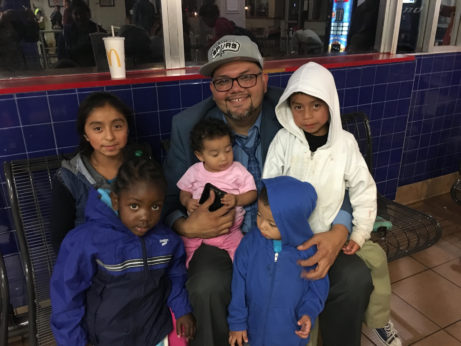
The real lawbreakers here are on the other side of the barbed wire, that is, the folks running this illegal operation, Vargas points out.
In 2015, Federal District Court Judge Dolly Gee ruled DHS policies were in violation of previous court rulings on detention policies relating to immigrant children. She prohibited DHS from keeping children in detention more than 72 hours and from holding them in prison-like facilities that were not licensed to care for children. Neither GEO’s nor CoreCivic’s facility meets Judge Gee’s standards, yet federal authorities continue to turn babies and children over to unlicensed GEO and CoreCivic private prison companies for extended periods.
In fact, says Vargas, the entire policy of punishing asylum seekers is illegal. It was initiated in 2014 under Jeh Johnson, secretary of Homeland Security in the Obama administration. The policy is to deliberately make things tough on the refugee families so word will get back home, discouraging other persecuted folks from seeking asylum. It’s that illegal policy that is the basis of the booming family detention center business.
In early 2014, only 95 family detention beds existed in the whole U.S., according to Human Rights First. Three years later, two neighboring massive family detention centers here have a capacity of thousands.
In 2015 a federal judge cited the U.S. Constitution’s 5th Amendment’s guarantee of “due process” in ruling that the administration could not detain an asylum-seeking individual for the sole purpose of deterring other refugees. Each asylum seeker has the right to have her or his case decided on its merits; there can be no mass incarceration justified by intention to deter others, Attorney Govindaiah told People’s World. Following the 2015 court ruling during the Obama administration, 136 House Democrats, including Minority Leader Nancy Pelosi, added their objections to the judge’s, pointing out, “The hypothetical recurrence of a future refugee flow does not justify the very real harm being inflicted upon mothers and children” in the detention setting.
Profits drive mass incarceration of asylum seekers
But profits appear to be the main driving force for the mass imprisonment of refugees. The more prison-like their refugee experience, the more money gets generated, Vargas says. There are big bucks to be made in locking people up. What’s more, refugee detention is a growth industry, he continues.
The for-profit prisons are tangled in a web of corruption and human suffering connecting sleazy politicians, scheming contractors, and gerrymandered Congressional districts.
“Ground Zero for family detention is Texas’ 23rd Congressional District,” says Vargas. The 23rd hosts both GEO Group and CoreCivic’s mega centers. Last month, the U.S. District Court for the West District of Texas ruled that the Republican-dominated state Legislature that cobbled the district together along 804 miles of the Texas-Mexico border “acted with an impermissible intent to dilute minority voting strength or otherwise violated the Fourteenth Amendment.” The 23rd District’s representative is Republican Will Hurd, a former CIA analyst and cyber security executive who heads the House Committee on Oversight and Government Reform’s Subcommittee on IT. Hurd is a beneficiary of GEO’s PAC fund according to website open secrets.
In the district next door, GEO was Rep. Henry Cuellar’s (D.) biggest donor in both 2014 and 2016 according to a report by Detention Watch Network, A Toxic Relationship: Private prisons and U.S. Immigration Detention. Cuellar sits on the Homeland Security Appropriations Subcommittee, a subcommittee that inserts a quota in Homeland Security’s budget every year requiring the agency to maintain a high number of detention beds.
CoreCivic, then CCA, spent $9,345,000 lobbying the federal government from the first quarter of 2010 through the fourth quarter of 2014, reports American Friends Service Committee. During this time CCA lobbied both houses of Congress, the Department of Homeland Security, the U.S. Marshals Service, the Federal Bureau of Prisons, and the Department of State on budgetary appropriations for immigrant detention and federal incarceration contracts, “monitor[ing] of immigration reform,” and against the Private Prison Information Act (a bill which would have subjected private prison contractors to transparency under the Freedom of Information Act).
Shaping policy to lock up families
Both CoreCivic and GEO Group have their own PACs. In 2015, CoreCivic and GEO between them hired 20 lobbyists to work the nation’s capital. The following year, 2016, CoreCivic landed its billion-dollar four-year no-bid contract to run its Dilley Family Detention Center. Land for CoreCivic’s billion-dollar cash cow was leased from a real estate firm connected to San Antonio billionaire Red McCombs, according to the Texas Observer.
The Family Detention Centers run by CoreCivic and GEO, are only one component of the private prison industry they dominate. Their stocks fell last year when then-deputy Attorney General Sally Yates announced that the Federal Bureau of Prisons would move away from use of privately owned prisons. But since Trump’s inauguration, for-profit prison stock prices have sky rocketed – GEO’s by 80 percent and CoreCivic more than doubling since the election, according to financial columnist Jeff Sommer of the New York Times.
The multi-billion-dollar firms have a direct interest in legislation and regulations that would increase criminalization of refugees. In a report to its shareholders in 2007, GEO group warned against the “loosening of immigration laws or deportation practices,” pointing out that such changes could adversely affect the demand for its detention facilities.
Last October, GEO’s lobbying payroll added two former staff members of now-Attorney General Jefferson Sessions. The new staffers, David Stewart and Ryan Robichaux, are assigned to focus on federal contracts with private prisons. GEO contributed $464,000 and CCA $210,000 to the 2016 congressional and presidential races according to a December 2016 report by Detention Watch Network.
According to the Arizona Republic, “For the past few decades, a CCA executive has been a member of ALEC’s [American Legislative Exchange Council’s] task force that produced more than 85 model bills and resolutions that required tougher criminal sentencing, expanded immigration enforcement and promoted prison privatization.”
“Engagement by private prison companies … indicates that they are … actively shaping policy decisions,” said the Detention Watch report.
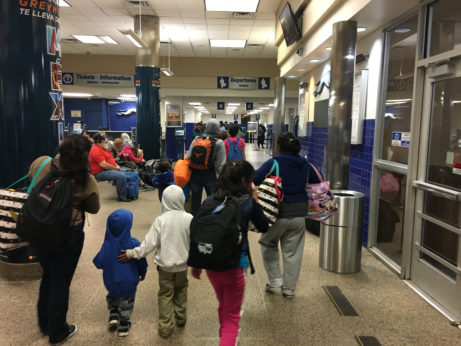
Trump’s plan to separate babies and mothers
“We need to close these places,” says Vargas. But the Trump administration appears bent on using babies and moms as examples to deter others in Central America who might consider traveling to the U.S. On March 7, Homeland Security Secretary John Kelly shared plans with a group of reporters to tighten the screws on asylum seekers. He described a strategy of threatening to separate babies and children from their mothers at the border. “As this word gets out,” he said, “that we’re considering it and maybe we’ll implement it, that will add again to this factor of people not coming.”
“They will be well cared for as we deal with their parents,” Kelly later told CNN’s Wolf Blitzer. “We have tremendous experience in dealing with unaccompanied minors. We turn them over to HHS [Health and Human Services], and they do a very, very good job of either putting them in some kind of foster care or linking them up with parents or family members in the United States.”
Putting that plan into effect would mean that adults would be placed in long-term detention, most likely in a for-profit facility, according to a report from the Center for American Progress, while children would be transferred to shelters contracted by the Office of Refugee Resettlement (ORR) at a cost of $248/day.
The American Academy of Pediatrics issued a strenuous objection to Kelly’s plan to separate children from their families as a tool of law enforcement. The Academy urged policymakers “to always be mindful that these are vulnerable, scared children.”
”Detention damages the mental health of children, causing depression, post-traumatic stress disorder and suicidal behavior,” reports Human Rights First.
‘Tearing scared children from their parents’
Rep. Raul Grijalva was more blunt: “Intentionally tearing scared children from their parents is revolting, and I am deeply disturbed that Sec. Kelly and DHS would even consider such an inhumane policy,” the Arizona Democrat said in an angry statement the day after Kelly’s announcement. “We would be inflicting more trauma than any child should ever have to experience in their lifetime. Families fleeing violence and oppression have already experienced enough emotional and physical stress by the time they have reached the border. Our government should not be the source of any additional suffering.”
The word is out all over Central America, the women at the Greyhound station told People’s World. Elisabeth, 21, of El Salvador, traveling with her 16-month-old, Rony, said she heard it on CNN Español. Yahira, the refugee from gangs in Honduras, says she heard it too, but doesn’t believe that this heartless psychological warfare will work.
In her case, Yahira said, “If Ciana was taken from me, I would die. But even knowing that, I came anyway, because I knew if I stayed in my country, we would both die.”

MOST POPULAR TODAY


Zionist organizations leading campaign to stop ceasefire resolutions in D.C. area

High Court essentially bans demonstrations, freedom of assembly in Deep South

Afghanistan’s socialist years: The promising future killed off by U.S. imperialism

Communist Karol Cariola elected president of Chile’s legislature


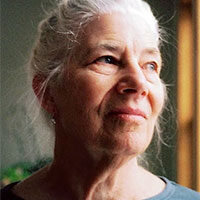



Comments